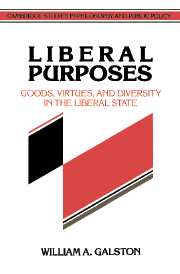Book contents
- Frontmatter
- Contents
- Acknowledgments
- PART I LIBERALISM AND POLITICAL PHILOSOPHY
- 1 Introduction
- 2 Peirce's cable and Plato's cave: objectivity and community in contemporary political philosophy
- 3 Contemporary critics of liberalism
- PART II LIBERALISM AND NEUTRALITY
- PART III LIBERALISM WITHOUT NEUTRALITY
- PART IV FROM THEORY TO PRACTICE IN THE LIBERAL STATE
- Notes
- Index
3 - Contemporary critics of liberalism
Published online by Cambridge University Press: 05 June 2012
- Frontmatter
- Contents
- Acknowledgments
- PART I LIBERALISM AND POLITICAL PHILOSOPHY
- 1 Introduction
- 2 Peirce's cable and Plato's cave: objectivity and community in contemporary political philosophy
- 3 Contemporary critics of liberalism
- PART II LIBERALISM AND NEUTRALITY
- PART III LIBERALISM WITHOUT NEUTRALITY
- PART IV FROM THEORY TO PRACTICE IN THE LIBERAL STATE
- Notes
- Index
Summary
The primary purpose of this book is to reject a pervasive theoretical understanding of liberalism as neutral regarding human goods and to replace it with an alternative understanding of liberalism in which specific goods and virtues figure centrally. My project, then, unfolds as a disputation within the liberal tradition, broadly defined.
But there is an impediment to the execution of this project. Even though events in Europe, the Soviet Union, and China have significantly undercut the credibility of Marxism, the critique of liberalism continues unabated. Today's critics appeal not to discredited ideas such as the dictatorship of the proletariat and the withering away of the state but, rather, to aspirations alive and potent within the contemporary public culture of the West. Readers may well feel that a dispute remaining within the ambit of liberalism is bound to be a somewhat scholastic affair unless these far-reaching criticisms of liberalism are addressed.
This is by no means a simple task. The literature of criticism is vast, and it assumes no one canonical form. Still, certain characteristic political themes may be discerned. Liberalism is said to undermine community, to restrict unduly opportunities for democratic participation, to create inegalitarian hierarchy, and to reinforce egoistic social conflict at the expense of the common good. Community, democracy, equality, virtue – these constitute the mantra of contemporary antiliberalism.
Beyond this core, as we shall see, the critics diverge. Some, for example, view liberalism as constricting personal freedom, whereas others regard the liberal emphasis on freedom as thwarting a fuller human identity that can transpire only within communities of tradition.
- Type
- Chapter
- Information
- Liberal PurposesGoods, Virtues, and Diversity in the Liberal State, pp. 42 - 76Publisher: Cambridge University PressPrint publication year: 1991

